
Zinc And Immune Health: Benefits And How To Get It In Your Diet
Without enough zinc in your diet your immune system is less likely to be able to fight off harmful viruses like coronavirus and other illnesses as little as the common cold.
Here are the recommended dietary allowances of zinc:
Children
- 7 months to 3-years-old: 3 mg/day
- 4-8-years-old: 5 mg/day
- 9-13-years-old: 8 mg/day
Women
- 14-18-years-old: 9 mg/day
- 19-years-old and older get at least 8 mg/day
- Pregnant over 19: 11 mg/day
- Breastfeeding over 19: 11mg/day
Men
- 14 and older: 11 mg/day

Zinc In Foods And Supplements
Zinc is an essential mineral needed for overall health and immune system function. Yet, the body does not make it. We need to get zinc from our diets. But just how do to get it in your diet?
This mineral is commonly found in meats and poultry (2.13 mg per 1 cup of chicken breast), as well as in fish like oysters (5.5 mg per raw oyster) and lobster (4.7 mg per small lobster). Strict vegetarians might have a hard time reaching dietary guidelines, so adding a zinc supplement might be a great idea.
However, there are lots of vegetarian-friendly sources of zinc. This includes vegetables like mushrooms, kale, broccoli, spinach, as well as whole grains, nuts and seeds, and legumes.
For example, 1/4 cup of hummus has .89 mg, black beans have 1.93 mg, pumpkin seeds have 2.17 mg, and raw oats have 2.95. Keep in mind that vegetables are low in zinc such as mushrooms that only have 0.4 mg of zinc and kale as 0.3 mg in 1 cooked cup.
The best way to add zinc into your diet to get those immune system boosting benefits is through your diet. Make recipes like a beef roast with root vegetables or beef stew, grilled chicken with mushrooms and whole grain rice. Try snacks like cashews and almonds. Fortified cereals that are rich in iron with milk and strawberries are a great and easy way to get zinc into your diet.
Zinc also can’t be stored in the body. This is why adding a zinc supplement is a great idea. And especially so for children who probably are not eating oysters and mushrooms. An option like NDX Kids Gummy Cuties Echinacea Vitamin C & Zinc has 2.5 mg of zinc, along with other immune-boosting vitamins like vitamin C and A.
It’s also worthy to note the zinc needs vitamin A, vitamin D, and selenium to be absorbed to its maximum. This is yet another reason why a supplement that contains these and other nutrients is essential.

Health Benefits
Zinc is found in every cell in the body, needed for the development and function of immune cells. It has many health benefits including that specifically for helping to boost immunity. This is because it may relieve stress on the immune system when it is faced with a threat, helping to boost the function of T-ells which are the cells that protect against infection.
Studies found that zinc can help reduce the duration of the common cold. It was also found to reduce the risk of pneumonia in older adults.
Other studies suggest that is might reduce the amount of upper respiratory infections in children. As a result, among COVID-19 widespread, adding a since supplement for children might be a great preventive health measure.
Other health benefits of zinc include:
- Reducing the risk of heart disease
- Improving eye health
- Improving thyroid health
While there is currently no treatment or cure for COVID-19, adding zinc is a great way to prevent viruses and viral infections to increase immune health—especially for children and elderly who are at higher risk of being deficient in zinc. A zinc deficiency can greatly negatively affect the body’s ability to fight off illness.
Sources:
Zinc, WebMD
https://www.webmd.com/vitamins/ai/ingredientmono-982/zinc
Zinc: Everything You Need To Know, Jillian Kubala, MS, RD Healthline




